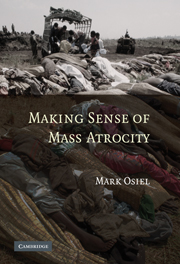Conclusion
Published online by Cambridge University Press: 15 September 2009
Summary
“Who done it?” is not the first question that comes to mind as one seeks to make sense of mass atrocity. So brazen are the leader-culprits in their apologetics for the harms, so wrenching the human destruction clearly wrought, meticulously documented by many credible sources. Yet in legal terms, mass atrocity remains disconcertingly elusive. The perversity of its perpetrators is polymorphic, impeding criminal courts from tracing the true lines of responsibility in ways intelligible through law's pre-existing categories, designed with simpler stuff in mind.
We specialists in this emerging body of law are often left to speak loosely, like the laymen from whom we seek to distinguish ourselves, of the “big fish” and the “small fry.” These comforting colloquialisms, in fact, often seem to serve us – embarrassingly – no worse than the conceptual precision for which we continue poignantly to strive, perhaps pointlessly. Still, for ascribing blame and punishment, such ingenuous generalities – if refreshing in their unpretentiousness – cannot suffice.
Mass atrocity proves insidiously evolutionary, mutating to cover its perpetrators' tracks, subtly evading prior legal developments aimed at staunching it. Top genocidaires resemble common criminals less than they do reputable tax lawyers, structuring each new, large corporate transaction in light of the law's latest regulatory refinements in response to the last round of innovative deals. This process is illustrated by the “outsourcing” of war crime from regular armies to irregular militias or civilian contractors and by adopting an opaque lexicon for conveying criminal commands.
- Type
- Chapter
- Information
- Making Sense of Mass Atrocity , pp. 241 - 248Publisher: Cambridge University PressPrint publication year: 2009



